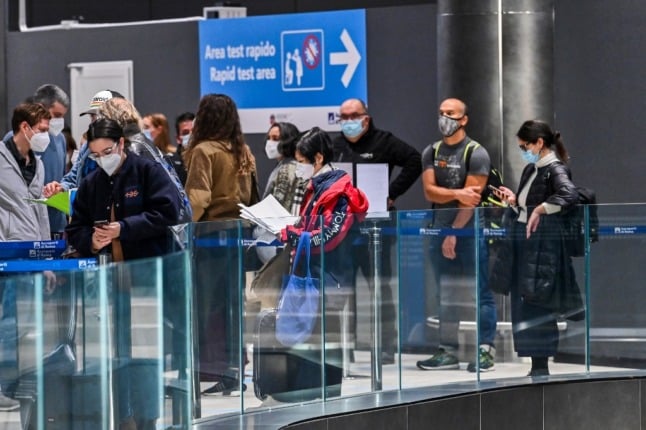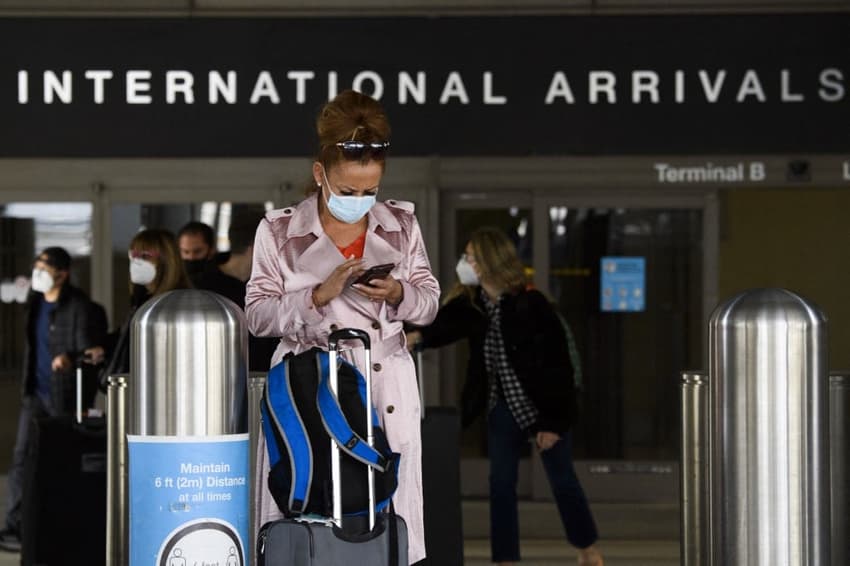Here’s a closer look at the current rules.
Entering Italy from the US or Canada
As mentioned above, entering the country is very simple as of June 1st, as no Covid documentation is required. Italy had already scrapped its requirement for passengers to fill out a dPLF (digital passenger locator form) on May 1st.
 Passengers who just landed from New York on an Alitalia flight wait in line. Photo by ANDREAS SOLARO / AFP
Passengers who just landed from New York on an Alitalia flight wait in line. Photo by ANDREAS SOLARO / AFPAfter arriving in Italy
A valid vaccination or recovery certificate is no longer required to access almost all indoor venues and transport services in Italy. All travellers are free to travel throughout Italy and enter restaurants, bars, cinemas, theatres and other indoor locations without having to provide any kind of health pass.
The only exception is for hospitals and care homes, which continue to require a ‘super’ or ‘reinforced’ green pass or its equivalent in the form of a foreign-issued vaccine or recovery certificate.
READ ALSO: Where do you still need to wear a mask in Italy from May 1st?
The only remaining Covid restriction – which will be in place until at least June 15th – is the obligation to wear a face mask in some indoor venues (cinemas, theatres and indoor sport venues, though not in restaurants, bars or public offices) and on all means of public transportation.
The government has confirmed that the requirement will be scrapped for the above-mentioned entertainment venues on June 15th. Whether masks will continue to be required on public transport beyond this date is currently still in discussion.
Keep in mind that only FFP2/KN95 face masks are accepted on public transport.
It's worth bearing in mind that although face masks are no longer required by law in other venues, local authorities and individual businesses can (and often do) impose their own, stricter rules – so it’s wise to have a mask readily available at all times, even if you’re not wearing it.
Testing to return home
If you need to take a Covid test to return home, these are relatively easy to come by in Italy.
A large number of pharmacies in Italy provide rapid testing services; look out for signs saying ‘test Covid-19’ in the window.
READ ALSO: How tourists and visitors can get a coronavirus test in Italy
If you need a PCR test you may have to book one at a specialist Covid testing centre, a medical lab, health centre or doctor’s office.
Once you receive your negative result (the test can not be a home test but must be administered by the pharmacy or lab itself), the pharmacy will issue you with a certificate that contains details of the test result and the time it was taken. In Italy this is known as a ‘basic green pass’ or green pass base, and comes with a QR code.
You can find detailed guidance on getting a Covid test as a visitor to Italy here.
Please note that The Local is unable to advise on individual situations. Please find more information about Italy’s current health measures on the Italian health ministry’s website (available in English).

Join the conversation in our comments section below. Share your own views and experience and if you have a question or suggestion for our journalists then email us at [email protected].
Please keep comments civil, constructive and on topic – and make sure to read our terms of use before getting involved.
Please log in here to leave a comment.